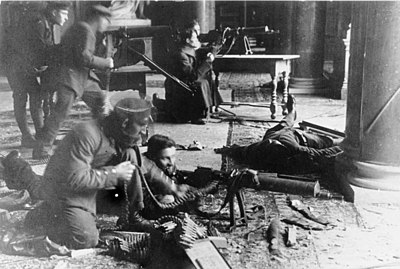First Tarperti Civil War
This article is incomplete because it is pending further input from participants, or it is a work-in-progress by one author. Please comment on this article's talk page to share your input, comments and questions. Note: To contribute to this article, you may need to seek help from the author(s) of this page. |
| First Tarperti Civil War | ||||||||
|---|---|---|---|---|---|---|---|---|
 Communist soldiers fire at Royal Guards | ||||||||
| ||||||||
| Belligerents | ||||||||
|
Supported by:
|
Supported by:
|
Supported by:
| ||||||
| Commanders and leaders | ||||||||
|
|
|
| ||||||
| Strength | ||||||||
|
|
| ||||||
| Casualties and losses | ||||||||
| 175,000 killed in action | 29,000 killed in action | 110,000 killed in action | ||||||
The First Tarperti Civil War, also know as the Tarperti Revolution, was fought in the United Kingdoms of Tarper from 1912 to 1914. The result of a long-standing controversy over the power of the monarchy and the rights of the workers, war broke out on April 1912, when the communists attempted a coup d'etat within the Realm Assembly Palace. Shortly after, Chancellor Charles Jarret Karl had deployed the Royal Guard to quell the dissenters. The monarchists proclaimed loyalty to the King of Tarper. They faced communist revolutionaries from the newly declared Confederation of Tarperti Communist Republics, which advocated for destruction of the Tarperti monarchy.
The Confederation and the Kingdom quickly raised volunteer and conscription armies that fought mostly in the northeast over two years. The Confederation finally won the war when Lord General George Harris surrendered to General Yakov Menendez at the Battle of Saint Constantine. This was followed by a series of surrenders by the remaining monarchist generals throughout the country. Two years of intense combat left 314,000 soldiers dead. The Interwar Era (1912–1938) overlapped and followed the war, with the process of restoring national unity, strengthening the national government, and granting civil rights to all citizens throughout the country. The Civil War is the most studied and written about episode in Tarperti history.
